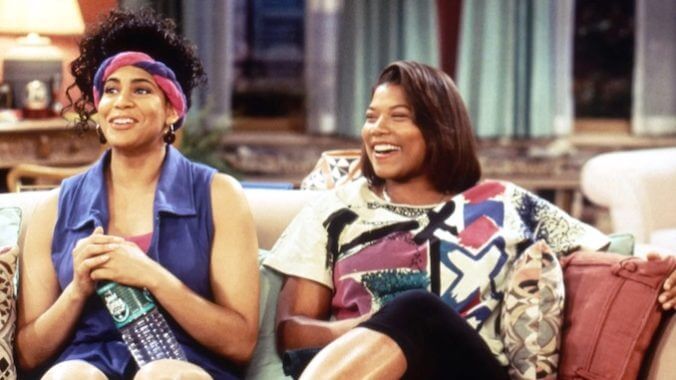That’s All, Folks: Queen Latifah Was Living Single in a Sitcom Made for a ’90s Kind of World
Photo Courtesy of Warner Bros Entertainment
Most scripted television shows end in cancellation, so there’s something special about the ones that get the chance to go out on their own terms. This year, Ken Lowe is revisiting some of the most influential TV shows that made it to an officially planned final episode. That’s All, Folks is a look back at television’s most unforgettable series finales.

Who gets to be sexy? Who gets to express desire? Who gets to live happily ever after? Who gets to put a ring on their millionaire boyfriend, or finally resolve their seething will-they-won’t-they situation? The answer should be “anybody!” But if you look across the landscape of American television, the answer to most of these questions, until very recently, has truthfully been the same one: Straight white people! Mostly men! Usually skinny!
Television is a chaste and homogenous medium, historically speaking: Even recent turns toward greater representation still fall short of America’s demographic realities. As the streaming revolution has fully taken over, creators have taken more artistic license to be less living-room friendly with their content, but that almost always means more violent rather than less prudish, and there are still dimensions of human sexuality that basically never get depicted on screen. These are always political considerations, at base. Somebody, somewhere, is deciding what people do and don’t watch.
All this is to say that Living Single, the unapologetically frank Queen Latifah-led sitcom created by Yvette Lee Bowser, was a watershed moment in television. Bowser—not yet 30 when she created the show—was the first ever Black woman to develop her own primetime series. It’s a weighty legacy for such an easy, breezy show, but that isn’t the show’s fault. One particularly memorable laugh in Season 2 stems from Kyle’s disbelief that he and Max have hooked up: Max wordlessly produces the ripped open wrapper of a condom by way of an answer. Bowser and her young stars (Latifah was just 23) were old enough to remember a time when that kind of gag would never, ever fly on network TV, and certainly not with Black actors in the lead roles. Queen Latifah did the theme song, of course.
By virtue of its importance to Black-led TV, it’s a landmark show, and by virtue of a twist that comes way out of left field, its finale is one for the books.
The Show
Living Single follows the single lives of friends living in a Brooklyn brownstone. In one flat are magazine editor Khadijah James (Latifah), her bubbly cousin Synclaire (Kim Coles), and the roommate who pursues wealthy men with a hunter’s zeal, Régine (Kim Fields). Upstairs are good-natured handyman Overton (John Henton) and his roommate, stockbroker Kyle Barker (T.C. Carson, the God of War videogame series’ original Kratos). Kyle is locked eternally in a tit-for-tat feud with a frequent visitor, Khadijah’s high-powered lawyer and former Howard University roomie Max (Erika Alexander, who you’ve seen in everything from Low Winter Sun to Get Out).
Episodes dealt with the dating adventures (and lots of misadventures) of the series’ leading women, Khadijah chief among them. White actors weren’t completely absent from the show, but it was almost exclusively a Black cast most of the time: If you were to put an episode of this show in a test tube with the average episode of another show about singles in New York, the chemical reaction might cause the two to explosively negate one another.
Over the show’s five seasons, the crew have their share of ups and downs, but most of the ongoing storylines come to their natural conclusions: Overton and Synclaire’s cute and uncomplicated attraction to one another is consummated, Khadijah has a rotating cast of long-term boyfriends but eventually rekindles a romance with childhood friend Scooter (Black Lightning himself, Cress Williams).
-

-

-

-

-

-

-

-

-

-

-

-

-

-

-

-

-

-

-

-

-

-

-

-

-

-

-

-

-

-

-

-

-

-

-

-

-

-

-

-









































